new posts in all blogs
Viewing: Blog Posts Tagged with: Nicola Morgan, Most Recent at Top [Help]
Results 26 - 31 of 31
How to use this Page
You are viewing the most recent posts tagged with the words: Nicola Morgan in the JacketFlap blog reader. What is a tag? Think of a tag as a keyword or category label. Tags can both help you find posts on JacketFlap.com as well as provide an easy way for you to "remember" and classify posts for later recall. Try adding a tag yourself by clicking "Add a tag" below a post's header. Scroll down through the list of Recent Posts in the left column and click on a post title that sounds interesting. You can view all posts from a specific blog by clicking the Blog name in the right column, or you can click a 'More Posts from this Blog' link in any individual post.
All this blogging, Facebooking, Twittering, Linkedinning, Diggiting and other more arcane forms of apparently essential author-profile-building - gah, it's amazing we have time to write at all any more! Of course, if you do none of this you are either a) feeling guilty / inadequate b) that and paranoid that every other author must be becoming better known, better connected and therefore obviously more successful than you or c) being rampantly Luddite and proud of your organic writing life and acquired technophobia.
Let's unpick this a bit and then I'll tell you why I use the tools I choose and what they do for me.
Two clichés: 1) there are many ways to skin a cat 2) horses for courses. Building your "profile" as an author can be done in many different ways and we should only do what we want to do and what feels comfortable. We are, above all, writers. If we let ourselves spend more time "networking" than writing and thinking and dreaming, then our profile is going to have nothing substantial to base itself on and we will lose touch with why we exist.
So, my advice to all authors is:
- Don't panic, Captain Mainwaring. It's not even a commercial.
- Take your time to try various possibilities
- Each tool seems completely mad when you first begin - everyone's first "tweet" reads something like "well, I made it 2 twitter - WTF do I do now?"
- Doesn't matter whether you take it ultra-seriously or dip in and out - do it your way
- Don't let it take over your life, ever
- Enjoy it or don't do it
- People survive perfectly well without all of this
- BUT, every now and then you will make a fabulous connection with someone who could end up being a genuine friend, excellent colleague or very useful contact. But the same could be said of going to a party, reunion, meeting, lecture or supermarket ... (It's just somewhat less likely, statistically).
So, what do I do, how much time does it take and what do I get out of it?
I think I am registered on most of those things like Linkedin and a few writerly equivalents the names of which escape me. Which tells you how useful I have found them. As in not. So that takes me zero time and I get zero out of it. (There's a lesson there).
I blog. Obviously I blog because here I am.
This blog takes me half an hour a month to write, and 5-10 minutes every time someone else posts, so I can read and maybe comment. I get out of it the feeling of being part of a community (we email off-blog too) and being able to listen to other readers; some people may read me who otherwise wouldn't have; and the act of writing something is good practice. It's fiun and it's easy. No pressure.
My other blog (
Help! I Need a Publisher!) takes up a lot of time. Maybe an hour a day, often more. I blog on it at least three times a week, and reply to all comments - most posts get around 20 comments, sometimes as many as 50ish. People also email me off-blog (including agents, editors and publishing industry people). That sounds like a lot of work for no money and it is a lot of work but here's what I get from it:
- it's become a whole new career strand, with many invitations to speak to writers (on Creative Writing MA course, for example)
- it's taught me a lot, as more and more people contact me with their own views, knowledge and experiences; it's broadened my knowledge outside the UK
- I've been interviewed for or done guest posts on many other blogs, which would never have happened
- I love doing it, love the free style of writing and the instant feedback
- I've made friends, genuine friends, as in people I can phone, email and meet
- With one of these new friends, fellow blogger Jane Smith of How Publishing Really Works, I'm planning some exciting projects which actually will earn us some income from what we both do.
- I know I've sold some of my books, as I've gained readers who would never have heard of me
- people have brought me chocolate. Really. Three times. And people have recognised me by my shoes or boots. Extraordinary.
Blogging, then, can be very rewarding. But you have to want to do it; you have to know what you want to say, and be prepared to open up your personality (or I guess you could always invent one if you wanted - after all, the internet lies ...). It's a form of writing itself, very real, very good fun, very flowing, very instant. And it can lead to a greater "platform" or profile, too.
I Twitter. Twitter is very weird when you start because you're essentially twittering to yourself until people start to follow you. I could write a tutorial on how to get started on twitter but this is not the time for that. (Except to say that if you "follow" me, then I'll almost certainly "follow" you and then you'll quickly see how it works, and I'll help you along. Start your free account at www.twitter.com and in "Find people" put @nicolamorgan).
How much time do I spend on Twitter? Probably 10-20 minutes a day, split into half a minute at a time.
What do I get out of it?
- because I follow the Bookseller, Book2Book and industry experts such as Scott Pack, I know that I will get industry news first, before it's published, so I'm always informed
- it's easier for people to discover you on Twitter than on a blog, so people have come across me through the chain of twitterers
- Twitter is easily linked to your blog, so a) a blog post goes instantly to Twitter, where your followers can "retweet" to all their followers and b) vice-versa, so every "tweet" of mine goes onto my blog automatically, so blog followers see more informal messages than blog posts
- Twitter organises "tweetchats" - so you get to know that, for example, Mon/Wed/Fri, 9-10pm GMT, there's always "litchat", a load of people around the world chatting about a lit-based topic. There are things like writechat and amwriting and pubchat (publisher, not pub ...). Through this, I've made more contacts.
- I love the even greater instant-ness and public-ness. It's like Speaker's Corner except you can only shout 140 characters. (Thank goodness).
- I publicised some Edinburgh Book Festival events on Twitter and I know that a couple of people only heard about it through that. I know about a couple but assume there were more
- And in the last week I have twice been invited to speak, purely because of a message I put on Twitter
- It's fun
- It's free
What about Facebook? I do that too, but less than I used to now I use Twitter more. For me, Facebook is purely social and relaxing, nothing to do with work-related "networking". My Facebook "friends" are more genuinely friends, though I admit I haven't physically met them all. How much time? Some days only a quick look; other days I'll get involved in a fun message thread (especially if people like Gillian Philip, Philip Ardagh or Bookwitch are on form!) and come back several times during the day. What do I get from it? Contact with friends. Fun. Relaxation.
People can be very disparaging about all this, and use the word "networking" in a very sneery way. Some people, I agree, do it very calculatingly and some do it unattractively. Some people on Twitter can be very boring - there's one person who just says "Morning all" every morning, but on the other hand isn't that what real people do when meeting other real people as they arrive in their offices? This is all, really, about new forms of human interaction. You can call it networking and be disparaging if you want. I call it making human connections. I like doing it and I get something out of it; I hope I give something too.
But, as with all forms of human interaction, it's all about doing what works for you and feels good for you. All I'd say, though, is if you don't try it you'll never know.
This blog post has been far too long - it's kept me from Twitter for at least half an hour.
 Today, the Edinburgh International Book Festival ends. Many of you were there, either in the Yurt of all Yurts, or else (if you were lucky) reclining in glorious sunshine, eating ice-creams and watching the booky world go by, or (if you were unlucky) suddenly finding yourself stranded in a sea of mud.
Today, the Edinburgh International Book Festival ends. Many of you were there, either in the Yurt of all Yurts, or else (if you were lucky) reclining in glorious sunshine, eating ice-creams and watching the booky world go by, or (if you were unlucky) suddenly finding yourself stranded in a sea of mud.
It's been a record-breaking year. I don't know all the figures yet but I know that the first day saw record footfall (over 15,000 pairs of feet); the first weekend saw record book-sales; similarly ground-breaking figures for ticket-sales and, incredibly for a recession, a 10% increase in sponsorship.
The book is not dead. Nor are readers. In fact, here are some:
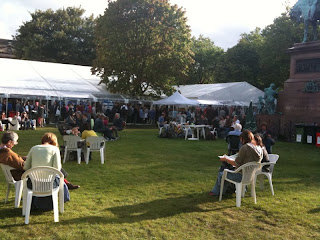
More sunshine:
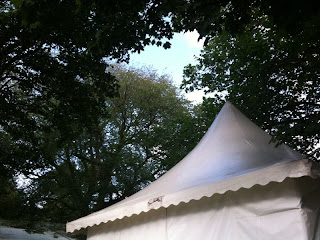
THE YURT OF ALL YURTS
The Yurt (or Yogurt) is a strange place of peculiar smells and unpredictable experiences. It can make any author feel either unexpectedly important or shatteringly small and worthless. You see people you've only seen on the telly, and you find yourself sharing a drink with them or explaining where the Highland Park is hidden; you experience your chest being peered at by a politician wanting to see if you're a name worth talking to, or you could all too easily trip over a carpet and find yourself on the lap of your literary hero.
In case you haven't been, here are a few images, carefully taken with no identifiable people.
Below is the hospitality table with, remarkably, no one there. It took me a
very long time to catch that.
I do often find myself gazing at the roof, not because I spend a lot of time on the floor but because it's rather lovely:
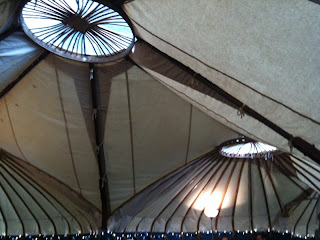
And the entrance, looking unimpressive, deceptively unalluring and small:
Each year, the Yurtish smells bring back memories of other years. First thing in the morning, when the thin sun slices through the opening, you can imagine that the staff slept there, wrapped in yak blankets, and then unwrapped themselves and washed their faces in dew just in time for the appearance of the earliest authors - did you, Roland? Oisin? Lois? As the day wears on, it's essence of coffee and Highland Park, chocolate brownies and goat cheese wraps, ground into the carpets by shoes of all descriptions. (Including mine, which have achieved a reputation for pointiness and getting caught in carpets.) And in the evenings the woodchip burning stove is lit and it's the dry sweet pininess of a sauna. As the night draws closer, more Highland Park, more wine, more wine, more Highland Park. And the rising laughter muffled in the folds of the roof, disappearing like the smoke from a Mongolian fire.
Just to show that I don't always wear pointy shoes, here are my feet on a day off:
One author told me yesterday of how he could not enter the Yurt when he arrived this year. Panic swept over him as he contemplated, remembered, envisaged the sounds of bursting egos. Like a child at a party who is so afraid of the balloon as it is blown up that he puts his hands over his ears and runs from the room.
Others love it. Love the possibility of meeting just anyone, of being on a level with the biggest names in literature. I have loved it and hated it but I go there in anticipation every time. My favourite moment (not this year) was of meeting Michel Faber and feeling suddenly compelled to do that fan thing.
"Excuse me," I said, "I just have to tell you that I adored The Crimson Petal and the White. And as for Under the Skin ..."
And he knelt at my feet ... Sorry, I have to say that again. HE knelt at MY feet. Red trousers he was wearing, and his eyelashes pale and soft and his face open. I asked him what he was writing now and he said he couldn't write at all any more, that his creativity had been damaged by his horror at the Iraq War (as I say, not this year) and he didn't think he could ever write again.
But he has, of course. And I've read it. We talked for ages about creativity and inspiration and integrity and I'm just so glad that it all came back to him. I'm so pleased that I met him, that he gave that time to talk to me, which of course he won't remember. And that I
dared be in the Yurt that day and
dared tell him that one thing that all writers, from the most famous to the least, need to be told,
"I just loved your book."
That's what book festivals, all of them, are about. Just loving books and having moments of magic when readers meet authors and the connection is story, words, imagination, truth.
There's one thing I
know is magic (and if you believe otherwise, please stay silent): the disappearance of the Yurt into thin air when the festival is over. Because of course it's not stored in some dull lock-up somewhere. It couldn't be. And obviously it can't be used by anyone else. Besides, you can't just fold away miles of canvas that has soaked up the hopes and fears and dreams and passions of 750 writers and several bottles of whisky and wine; you just can't. It has a soul: you can't wrap that up. It disappears, I know it does. You wake up the next day and it's just not there, only a pale patch of grass that is far too small to have held so much.
But it will be back, next year, by magic again. Meanwhile, it is nowhere. Or at least not in this world.
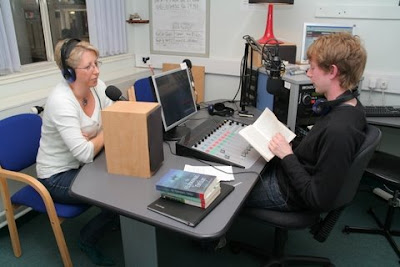
Gah! What have I said, or what am I about to say, or what might someone think I said, or what did I really mean to say? What if I say something really, really stupid? What if I already have?
Please tell me I'm not the only one. See, every time I'm about to have something published I suffer a serious case of exposure anxiety. It manifests itself in my dreams. I'll have classic exposure dreams - things like needing to go to the toilet but finding that there's only a clear glass door between me and a load of strangers, or realising that I'm walking down the street without certain parts of my body being appropriately covered.
I sometimes have dreams where the News of the World has got hold of the really embarrassing things I did in the past and they're going to tell my parents. (I hasten to add that there were no embarrassing things, other than the time when ... but no, the News of the world will NEVER get that. Will it? Oh my God, what if ....?).
Thing is, having something published IS very exposing. Not in a way you can be arrested for, but in a way which is very anxious-making. We know (or if we don't, we soon find out) that lots of people won't like our book, even if lots of people do. Some readers will be vocal in their opinions, and even when the opinions are positive, many readers will see things in our books that we didn't consciously put there and which we didn't mean to be read into them. We will be misinterpreted and spoken about as though we're really really stupid. We see ourselves written about and talked about. And nowadays the reviews and comments are so permanent - which is good ... and bad. But anyway VERY exposing.
We do interviews in which journalists make weird and wrong assumptions or get facts wrong. I was seriously pissed off once when a journalist came to my house to interview me about Blame My Brain and asked me if she could speak to my older daughter. Now, my daughter hates being interviewed or photographed (after a previous horrible experience) and so I said she couldn't; then, in the article, the journalist referred to my "teenage daughter upstairs in bed". Actually, she was in her bedroom, writing an essay ... Yes, a small mistake, but one which had its effects.
I envy those authors who are confident enough and important enough to play the recluse card and keep their privacy, but even they are inevitably exposed as soon as their book is published. You don't get fewer reviews just because you hide. (Yes, I know we all in theory could be recluses, but we're not really allowed that option. Most of us have to do what we can to raise our profiles, not shrink them. Most of us have to do the equivalent of the model walking confidently along the catwalk, when inside we may feel very vulnerable and self-conscious.)
We lay ourselves on the line, allow ourselves to be hung out to dry, and we're supposed to maintain a calm and smiling exterior, never lashing out at public criticism.
Look what happened to Alice Hoffman and Alain de Botton when they lashed out. OK, they may have been unwise but in the old days it never would have become so public. It's all so immediate, so unforgiving and so hellishly permanent nowadays. (Maybe they have glass toilet door dreams, too?)
The need to be careful about what we say on blogs and websites and in interviews just adds to the exposure anxiety. The SoA has even suggested Professional Indemnity insurance for authors, to insure against the costs of being sued for defamation, for example. And I notice (because I've looked, carefully, paranoidally - is that a word?) that you have to pay extra for including your website, blog or other online presence.
Never was the power of words stronger and more frightening.
I feel a bad dream coming on. Someone, please, tell me I have got the appropriate body parts covered. And if I haven't, wake me up gently.
 There was one Thing You Shouldn't Say to an Author which I quite forgot: "I haven't seen any reviews of Deathwatch anywhere," said a certain author's elderly acquaintance (possibly related) who lives in a tiny village in Scotland, skims "the" newspaper and doesn't use the internet because, although he technically has broadband, you'd never know, and because his computer is perched in a gloomy corner of a poorly designed room which gives him a crick in his neck after ten minutes peering at the screen. And ten minutes is how long it takes his computer to boot. On a good day, with the wind in the west and the fish beginning to bite.
There was one Thing You Shouldn't Say to an Author which I quite forgot: "I haven't seen any reviews of Deathwatch anywhere," said a certain author's elderly acquaintance (possibly related) who lives in a tiny village in Scotland, skims "the" newspaper and doesn't use the internet because, although he technically has broadband, you'd never know, and because his computer is perched in a gloomy corner of a poorly designed room which gives him a crick in his neck after ten minutes peering at the screen. And ten minutes is how long it takes his computer to boot. On a good day, with the wind in the west and the fish beginning to bite.
No, well, you wouldn't have seen any, would you? Yes, there were lovely reviews, even in newspapers, even in a few decent ones, but with 10,000 children's books published every year in the UK, the chances of your young* acquaintance's book just happening to be reviewed in the Pittenweem Telegraph are about as slim as a very slim thing. Slimmer even than the Pittenweem Telegraph. (*artistic licence. Anyway, age is all relative.)
Thing is, we've moved on from a thralled reliance on newsprint and so much grubby ink, haven't we? Not that we'd turn our noses up at a review in the Guardian or the Book of the Week spot in the Sunday Times, of course - far from it: crikey, I'd have a party if that happened, or at least open the bottle of fizz which is waiting in the fridge for such moments and rapidly becoming vintage. But we don't rely on them because we have many more, and equally well-written and important, sources of reviews.
No, no, not Amazon, silly! Everyone knows that Amazon reviews are tainted. Lovely as it is to get four or five-star reviews there, we also know that they can be trusted about as far as a strawberry plant in the Sahara: the good reviews are as likely to be written by our mothers** or publishers** as the bad ones are to be written by an idiot / enemy / someone who was a bit pissed and bored at 3am. (I hasten to add that as far as I know neither my mother nor publisher has ever done this, but we can never be entirely sure what our mothers get up to at 3am.)
I'm talking about the growing number of increasingly respected and valued websites and blogs where sensible and knowledgeable people write sensible and knowledgeable reviews. Places like Achuka and WriteAway and the Bookbag and the Bookwitch. It feels to me as though, a few years back, readers moved from grovelling reliance on newsprint (when that was all there was) to a gluttonous and undiscerning vox-pop-fest of democratisation (when Amazon felt like the only place you could buy and comment on books), and that now we have something more useful and adaptable: a healthy array of places where serious, knowledgeable, passionate readers can give serious, knowledgeable, passionate views and share them with the like-minded. Because, after all, what's the point of a review by someone who's not like-minded?
I'm doing an article for the Author on this subject soon (like, er, rather horribly soon ...) and I'd love your views on that phrase in red above. "Increasingly respected and valued" - do you agree? How and why are some of them respected? Which ones do you (as readers or writers) value? Or don't you? As a writer, do you still blush with extra pride when you find yourself reviewed on scrunchable paper? As a reader, do you take more notice of a printed review than an on-line one? Do we care whether reviews are by "ordinary" readers, as opposed to "professional" reviewers. (Deliberately provocative adjectives there.)
Seems to me that people have been talking about the review being dead (and that link is only one example amongst vast numbers that you'll find by googling "review is dead") when in fact it's merely shedding its skin. And, though I don't claim to be an expert on snakes, I do know that when a snake is shedding its skin it looks pretty grotty and acts as though its not feeling very well at all. (I apologise for the technical lingo there.) But then it appears all sleek and gorgeous (for a snake), bigger and better and stronger than before.
The review is not dead at all. It's beginning to hiss loudly. And people are listening.
As all writers for young people know, we not only have to get our books to our intended readers: we have to get past the gate-keepers - adults. Now, adults are some of my favourite people but let me have a little rant about certain members of that group, specifically certain parents. I am a parent myself, so I know how parenty brains work and I’m sympathetic, but sometimes … HONESTLY.
Yes, I know there’s some pretty tough stuff goes on in my teenage books. I’m up front about that and I would totally understand if a parent of a 10 year old (eg) got a bit cautious about some of it. (Though I still think they should worry less about reading choices and more about some other things - like whether their child is reading at all ...) But anyway, I just had a librarian say that she wouldn’t stock Mondays are Red “because of the swearing” and she’d had a parent complain when a book had a rude word in it. Well, I didn’t remember any swearing in Mondays are Red until it occurred to me that I did say “Piss off!” once, when a character was really really really really ANGRY. Frankly, I think piss off was pretty restrained in the circs. And it was a teenage book and a teenage character. And the character didn’t say it to an adult or anything really terrible like that …
OK, I respect people’s views and I hate bad language myself - only ever use it when I’m bloody furious - but let’s see things in context here. Tell me how it’s fine that my books contain a mastectomy without anaesthetic in front of an audience of men (Fleshmarket opening chapter), death by blood-poisoning, trepanning (when a drill is twisted through someone’s skull), drowning, stabbing, snake-bite and the subsequent cutting of the flesh above the bite, a throat being cut, drinks being spiked, a massacre, drug use (without condoning it, btw), a horse being shot … I could go on but I’m actually starting to feel quite bad about all this. Am I really a horrible and dangerous person? No, I write stories, stories that aim to challenge and grip and provide a safe environment for fictional danger and risk.
Anyway, my point is, I can do all that death and worse, but I can’t say piss off? When I’m really really really angry? And when children and teenagers hear far worse every day in the playground and on TV and the cinema? (Which is not to say it's right, but then nor are half the other horrible things about the real world.) So, I should perhaps have had my teenage character say, “O bother!” Yeah, right. That’s really going to work.
Parents need to understand about fiction and its ability to prepare kids in the best possible way for the real world. They need, frankly, to get a bit real and decide which things are really worth protecting them from. Either that, or wrap their offspring in cotton wool, don’t allow them to go to school / watch TV / travel /go to the cinema / go on the internet / phone their friends, or read anything other than Enid Blyton. Oh, except that if they read EB, they’ll learn that girls are pathetic and boys are just the greatest leaders and that taking boats on stormy water across a sea with no adults is an OK thing to do.
Compared with which, the odd piss off seems like a very small risk to take.

My brain often gets stuck when I’m sitting at my desk. I put it down partly to the easy distraction of email etc, because it’s all just a finger-twitch away, and twitching that finger to the “sign on” screen is so much easier than writing. But I’ve often felt that it’s more than that. Even before the email tyrant took over, I’d noticed that if I was stuck on a story, the worst plan was to sit at my desk: the only way was to go for a walk. And so out I’d go, and lo and behold, within minutes all my problems (well, the writing-related ones) were sorted.
It got to the point when I’d answer the “Where do you get your ideas from?” question with “From my dog. See, I go for a walk with no ideas and I come back with ideas and I didn’t speak to anyone except the dog, so …”
None of this seemed like brain science, but I used it in the talks I do in schools about the brain, and how brains work differently, and how you can discover how your brain works. (For details, see Know Your Brain.)
But then I discovered that actually I couldn’t find anyone who didn’t relate to this thing about open space and walking as a way of freeing ideas. And, since I’m supposed to know that brains are different, I thought this was intriguing - but I didn’t really pursue it.
So, imagine how interested I was to read my newest issue of Scientific American Mind. There’s an article which explains it all in brain science terms. Seems we need space around us - and especially above us - in order to have creative ideas. And there’s growing research into this, with many architecture schools now incorporating neuroscience as well as environmental psychology into their syllabus. The environmental psychology isn’t new, but the neuroscience is.
For example, research in Minnesota in 2007 showed that people in a room with a higher (only two feet higher) ceiling came up with more abstract and uninhibited answers to questions than those in a room with a lower ceiling. Those in the lower room focused better on detail. This and other work suggests that higher ceilings help people think more freely and make abstract connections - just what a writer needs.
The article didn’t go to the logical conclusion - that outside is the biggest ceiling of all - but it did say that when we have scenery with greenery and nature we think better and differently. Research in 2000 followed some families who moved house, and looked at the attention ability of the children: those surrounded by more greenery after the move appeared to do better on a standard attention test. Other research showed that students had better mental focus when they had “natural” views, compared with those looking onto buildings.
There’s even a name for the human tendency to respond well to natural scenery: biophilia.
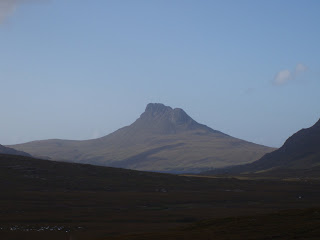
So, for me going for a walk is not instead of working - it’s an essential part of working. And I believe that this isn’t just about writers: everyone needs space to free those thoughts, get ideas flowing. So, every now and then (preferably every day) just stop focusing on the details of life for a while: get outside and let your mind fly.
Release your inner biophile!



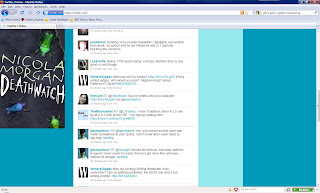






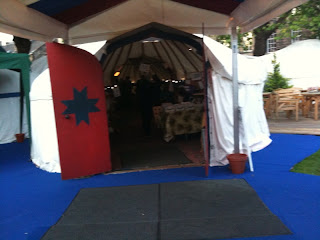


What a lovely post! You almost make me want to attend a festival. I won't, ever - but so far, you've come closest. (I'm also a Michel Faber reader.)
Ooh, Nicola, you took me right back there. I must add a mention of the crayfish wraps, though.
By the way the yurt is folded up and stored in an old brass lamp and is brought out with a quick rub of a duster each August. At least that's what I hear.
Those are the very shoes we didn't catch 'on film', Nicola. Thank you.
Didn't mention the toilets. Or os that your next installment?
Lee - glad I have almost inspired you!
Gillian - oh, thank goodness. I knew there was an appropriate explanation.
bookwitch - the very shoes! And as for the toilets, if you want to know, I did actually try to take a pic of the inside, but someone kept coming in and I kept having to pretend to be sending a text instead...
Beautiful, Nicola, and spot on in highlighting the way it manages simultaneously to make us feel as special as the celebs we're sharing the air with and as shy as the humblest of stammering fans. I envy the face to face (or face to knee) meeting with Michel Faber. I could only write to tell him how wonderful his Crimson Petal and the White was.
What a beautifully atmospheric post - I shall now aspire not only to be published but to be a Yurt-habitee (Yak blankets sound so cosy and the aroma of coffee and Highland Park is surely conducive to...well, I'm not quite sure what so I shall have to sample it and see!)
Nice shoes. And your posting made me feel I had reached Xanadu - a magic land, an oasis, if you like, on the Mongolian steppes, filled with laughter, congenial company and the joy of kindred spirits. All reached after a long time in the arid central Asian plains.
You captured it all so well, Nicola.
Today was the school's Gala day - general public not allowed - when the entire place is turned over to a chatter (is that the collective noun?) of children - all so excited to be there.
The yurt was quieter than it has been of late as if it was preparing to hibernate.
All of a sudden it is over and we will have to wait a whole year for it to begin again.
loved this lovely piece of writing, Nicola...it is a very wonderful Yurt and I had my last piece of quiche there this afternoon. Roll on next year! I too experienced the knee numbing sensation of meeting Michel Faber, not in the Yurt though......Ferguslie Park Library!
Thank you, all - glad it resonated. It's such an amazing place and even though I've been too tired and busy to enjoy it properly this year, I want it back again!
Nicola, thanks for that post. Loved it. Gives me something to aim for.